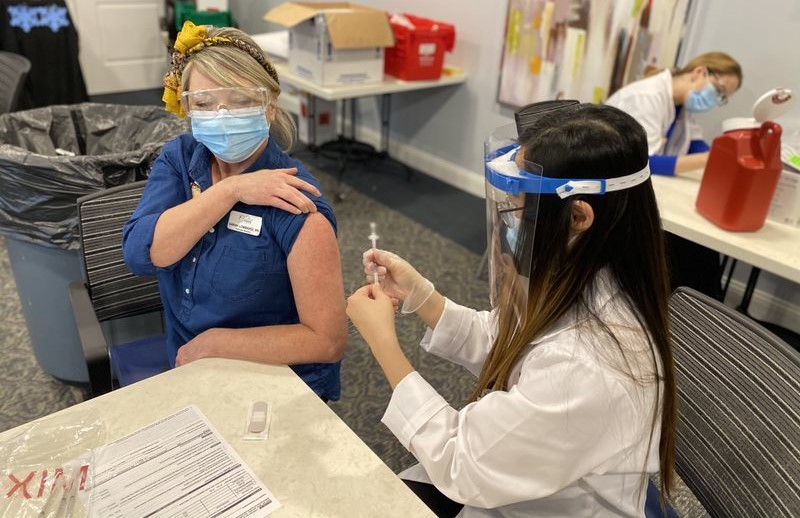Just after passing the one-year anniversary of COVID-19 wreaking havoc within senior living and other sectors in long-term care, providers continue to be challenged trying to increase staff vaccination rates.
Although long-term care resident vaccination rates are well over 80%, a Centers for Disease Control and Prevention report estimated that only 37.5% of staff members nationwide have received their first dose of a COVID-19 vaccine through the federal Pharmacy Partnership for Long-Term Care Program.
The federal program had brought national pharmacy partners CVS Pharmacy, Managed Health Care Associates and Walgreens into 63,000 assisted living communities and nursing homes in 49 states and had delivered approximately 1.86 million COVID-19 vaccine doses to staff members as of March 18, according to the Pew Charitable Trusts.
With that program winding down, many providers are working to determine how to continue vaccinating new residents and staff members. At the same time, they are continuing to work on building trust in the vaccines, the government and themselves while struggling to relax visitation and socialization restrictions and return a sense of normalcy in the wake of the pandemic.
Low staff vaccination rates leave senior living communities at greater risk for COVID-19 outbreaks, complicating their ability to reopen to visitors and activities. More than 174,000 residents and staff at long-term care facilities have died from COVID-19 since the start of the pandemic, according to the Pew Charitable Trusts.
Nationwide, only about half of workers in assisted living communities and nursing homes are fully vaccinated, according to information from the Center for Public Integrity. Past years’ low vaccination rates among long-term care workers for the flu gave a preview of vaccine hesitancy, according to an NPR article. Although disappointed in the low staff vaccination rates, Ruth Link-Gelles, Ph.D., an epidemiologist from the CDC, said that no one was shocked.
New Hampshire leads the nation in long-term care staff vaccination, with a rate of more than 80%, according to a published report. Vermont has the second-highest staff vaccination rate, at 78%, followed by Massachusetts and Colorado at 73%, Hawaii at 72% and Maine at 70%, according to information from the Pharmacy Partnership for Long-Term Care Program.
The report also revealed that Arkansas (10%), South Dakota (21%), North Dakota (23%), Wyoming (24%), Tennessee and Alaska (32%), Arizona and Missouri (38% each) and New York (39%) were among states with the lowest staff vaccination rates.
A Kaiser Family Foundation and Washington Post survey of 1,327 frontline healthcare workers, including workers in assisted living communities, found that safety, efficacy and the newness of the vaccine, as well as distrust of the government, were among the major factors workers cited for not receiving a coronavirus vaccine.
But there are signs of hope.
A recent OnShift survey of long-term care workers showed 62% were willing to take the vaccine, up from 32% in December.
Moving the needle
The American Health Care Association / National Center for Assisted Living and LeadingAge launched a #GetVaccinated campaign to achieve a previously announced goal of vaccinating 75% of nursing home and other long-term care employees by June 30. Although there are no systems in place to monitor progress of vaccine uptake in assisted living communities, NCAL has said that it is encouraging such communities to meet this goal as well.
A task force of behavioral science experts looking into vaccine hesitancy among senior living and skilled nursing staff members encouraged operators to focus their efforts on the “movable middle” by making vaccination easy, building trust in vaccine safety and offering vaccination incentives.
LeadingAge also hosted a town hall in partnership with the Black Coalition Against COVID to address staff vaccine hesitancy.
Some senior living providers are mandating employee vaccination as a condition of employment. ALG Senior, Atria Senior Living, Civitas Senior Living, Juniper Communities and Silverado have implemented mandatory COVID-19 vaccination policies in recent months.
Senior sentiment
A Seniorly March Senior Sentiment Report found that older adults are similarly divided on vaccines.
The survey of older adults found that vaccines don’t change behavior. More than 65% of older adults who received the vaccine reported that they did not change their behavior, and just over 5% reported that the vaccine was key in changing their plans to move to senior living.
Some are taking a wait-and-see approach on COVID-19 variants, whereas others mentioned heightened restrictions on senior living communities as a reason to put off a move into a community.



